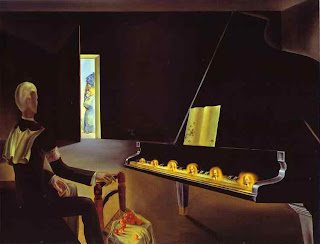 Before the advent of motorized sailing vessels,
Before the advent of motorized sailing vessels,
it is believed that certain species of whales could
communicate across the hemispheres.
I. INSIDE THE WHALE'S HEAD
We climb to there, to what seems
only rock or rubble from a distance.
My friends want to play,
but I'm new to the coast, still afraid
of what comes with the waves, undulating--
the long strands of kelp, sea palms
and weeds, whatever curls in on itself.
It must have known it could not go back
to fluid motion and grace, even as it
rose from the deep, gave its bulk to the tide.
I was inland when it beached. I didn't witness
the passage of breath, the souvenir hunters,
the mourners. My friends saw
the helicopter lifting it in pieces.
No one warned me about this.
Above the sea now, it bakes in the sun
--flesh gone to the air, the rest
growing into the earth. We walk
the length of the spine in our small shoes,
we touch the stumps of its bones, we circle
the jaw, we give away our words.
I am nothing when I stand inside its head.
Santa Cruz, CA
II. THE FISHERMAN CALLING
The fisherman stands far out on the rocks.
He is past the cove and we're just two women
who haven't learned the ocean. We watch him
cast and cast again through our binoculars
--his rod glints, the rocks glisten,
waves fall and fall on each other.
This once was a whaling station. We came looking
for spouts, but find only a man fishing morning away.
When he waves his arms, we think he has fallen or is
trapped by the tide. The speck of him grows in our glasses.
He waves, and we follow a path along the spine of the cliff
past allysum and poppy, foam and crash of surf.
The wind whips our hair, our feet rattle stones
--past thorn and stubble of grass-- the sea
booms against the rocks as we go to save the fisherman.
When we stand above him, we still don't see.
He cups his hands and shout, but the wind
takes his voice. Then he points to the water
below us. It rises, gray
mottled skin. It heaves its weight up.
Side and fluke. Eye. It dives and explodes again.
It grazes the rocks. Dives and rises again
-- the sea churning, the wind blowing,
the four of us joined each time in the air.
Davenport Landing, CA
III. FOLLOWING BY BOAT
Gale winds for a week. Now a drizzle
settles the sea and our rented boat
throbs over the bar, out of the harbor.
Binoculars and cameras hanging from our necks,
we pretend to be experts, not eager
for bubbles, for spouts, for seabirds flying low.
They are here, they are waiting.
They listen to out chatter, our jokes and our laughter.
Their shadows drift under the hull.
Now they rise to port, to port.
Now giants, now monsters
spangled with barnacles, five dancers leaping in unison
--buffalo, tiger, whatever has left us--
hill and rock, curve and sway of the universe.
Loop and slide of the dream, rolling over
and under, beside us, in front.
They touch. Body and drum, they sigh.
From the mouth of the Mad
to the mouth of the Eel River, past Table Bluff.
This we have lost.
All this, forgotten.
Eureka, CA
- Judith Minty

















































